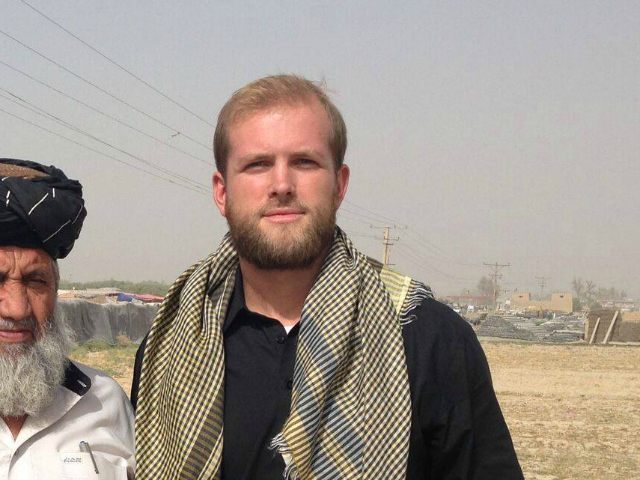Former Iranian hostage Matthew Trevithick gave some chilling details of his captivity to CNN’s Anderson Cooper, including an interrogator saying of fellow hostage Jason Rezaian: “He’s never leaving, and neither are you.”
Eventually they both did leave, although Rezaian got to sample Iran’s treatment of prisoners for much longer — over a year, compared to 41 days for Trevithick. Like Rezaian, the pretext for his imprisonment was espionage: “personally trying to overthrow the Iranian government,” for which purpose he was supposedly equipped with “access to bank accounts containing millions of dollars,” and “weapons caches that had secretly been planted around the country in preparation for a coup.”
Strangely enough, this mastermind in the ways of espionage was bagged by three guys in an unmarked car while on his way from the dormitory at Tehran University, where he was studying Farsi, to buy a plane ticket home, leaving all those million-dollar accounts and weapons stashes behind.
Just about everything Iran did to Trevithick is an actionable violation of international law and American sovereignty, although Iran will pay no price for any of it, instead declaring themselves delighted to have worked out a lopsided prisoner exchange with the U.S.
When he denied the charges against him, Trevithick was thrown in solitary confinement in a tiny cell, without a bed or pillow, for 29 days.
In a detailed diary of his captivity he wrote for Time, he spoke of being blindfolded every time he was taken from his cell, forced to lie to his own mother about vacationing in a mountain region without good cell phone reception, taken to a phony review of his case with an intelligence official that turned into another psy-war effort to force a confession out of him, and given false hope of release by a phony “judge.”
Near the end of his captivity, Trevithick was allowed to meet with Swiss diplomats, who promptly declared his treatment a violation of the Geneva Conventions. His Iranian interrogator responded by complaining about how many Iranians were held in American prisons.
On the day he was released, he was dragged from his cell to another interrogation room and told it was his “last chance” to make a videotaped confession that he was “here to overthrow the government.” The man running the video camera was wearing a surgical mask.
When he refused, he was menacingly told he had “made a very bad decision,” thrown against the wall, hustled back to his cell… and then finally released, after one last horrifying moment when turning the wrong way in a prison corridor would have taken him to “solitary confinement cells and God knows what else.”
Trevithick told his WBUR News in his native Boston that his experience was distressingly “typical” for Iranians. “When I started to realize who I was sharing the building with — intellectuals, professors, artists, poets, political dissidents — that actually, you can draw a very small amount of comfort from that.”
He believes he was kidnapped by the Iranian government for “domestic political considerations.”
“The domestic political situation completely changed from September to December, and, you know, I’m a Farsi student so after class you go out and you pick up the newspaper as a way to practice,” he told WBUR. “And week by week they got progressively more xenophobic, specifically anti-American, and anti-foreign in general. And you’re reading these things and when you read statements from the top leaders in that country, saying we must work to root out American influence, we must work to root out foreign corruption, you’re standing on the street with otherwise pleasant civilian folks who are all thrilled to have an American in the city studying, and you’re wondering: Does this mean me?”
He described Iran as “a nation at war with itself,” a factional struggle that pulls in outsiders to become “pawns in a three-dimensional chess game that’s occurring first inside Iran, and second with Iran’s relations with other countries.”
“Iran, as it’s discovering I think, cannot change 36 years of behavior and at times intense or at times light xenophobia. You can’t turn that on a dime,” he continued. “And while they may say they can, and ‘Oh, we’re open now for business and everyone can come,’ to expect radical changes in the way Iran conducts itself and conducts its affairs I think is premature.”

COMMENTS
Please let us know if you're having issues with commenting.